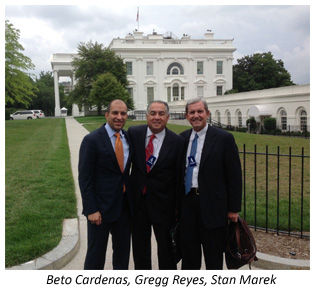 Amid the chaos in Congress and the humanitarian crisis on the Texas-Mexico border, construction executives from the Lone Star State traveled to the White House this past week to urge President Barack Obama to be smart about any executive action he might take to address longstanding challenges in immigration policy.
Amid the chaos in Congress and the humanitarian crisis on the Texas-Mexico border, construction executives from the Lone Star State traveled to the White House this past week to urge President Barack Obama to be smart about any executive action he might take to address longstanding challenges in immigration policy.
Their message to top administration officials was that it would be preferable for Congress to pass legislation on the issue. But in the absence of that – and seeing no evidence that the US House will act – the Republican businessmen from Texas would be okay with an executive order from the Democratic president allowing for millions of undocumented immigrants to stay in the United States as long as they can pass a background check, are identified, and taxed. As envisioned, this would amount to an expansion of the president’s controversial Deferred Action for Childhood Arrivals, or DACA. That executive action, as you may be aware, puts deportations on hold for two years for young immigrants living in the U.S. illegally. Those waivers are renewable.
Houston construction executives Stan Marek and Gregg Reyes, along with immigration attorney Beto Cardenas, met late Friday with Obama senior advisers Cecilia Munoz and Valerie Jarrett to talk about what might happen next as the administration grapples with immigration policy. Others were in the room as well, including representatives of Texas farmers. White House officials are holding more than a dozen of what they’re calling “listening sessions” with stakeholders. Those sessions wrap up this Friday.
On a call with journalists following their meeting, both construction executives pushed back against the argument from Tea Party activists and some others that what business leaders are looking for is cheap labor. Marek and Reyes both oversee construction companies that have voluntarily been using the E-Verify system for quite some time to check the legal status of new hires. Also, both of their companies pay employees more than $13 an hour to start and, even given that, they are often left wanting for enough authorized workers.
“No one should get a free ride,” Marek said. “These people need to be identified and taxed if they’re here to work.”
“It's a big issue. It's much bigger than politics. This has got to be fixed,” Reyes said. “At home when you've got a problem like the plumbing's broken, you fix it.”
Executive action to deal with immigration is nothing new – the politics of it have changed, however. The liberal publication Mother Jones reports that President Bush did much the same thing during his presidency and there was no corresponding political meltdown because of it:
“…presidents from both parties have long claimed the authority to grant temporary stays of deportation and work authorization to undocumented immigrants. In a series of memos issued after the 1996 Illegal Immigration Reform and Responsibility Act, a law that sought to curtail illegal immigration and prioritize removal of unauthorized immigrants, immigration officials in both the Clinton and Bush administrations established guidelines and limits for when authorities could exercise leniency in dealing with unauthorized immigrants.
“‘The [immigration] guidelines we issued in 2000 were not rescinded,’ says Doris Meissner, a top immigration official in the Clinton administration who is now a senior fellow at the Migration Policy Institute (MPI), a nonpartisan think tank that studies migration. ‘They're in place today; they were observed by the Bush administration.’ Those guidelines were driven in part by complaints that, as a bipartisan group of members of Congress argued in a 1999 letter to the Clinton Justice Department, the deportation process was ‘unfair’ and resulted in ‘unjustifiable hardships.’ [Representative Lamar] Smith signed that letter, which urged ‘discretion in removal proceedings.’ But now the congressman says the president is undermining the rule of law.
“Bush officials didn't just embrace the idea that the government can prioritize whom to deport – they expanded it. ‘The universe of opportunities to exercise prosecutorial discretion is large,’ Bush immigration adviser William Howard wrote in a 2005 memo. Howard recommended letting people stay in the country when ‘compelling reasons exist,’ such as an unauthorized immigrant being a relative of a US service member or for ‘sympathetic humanitarian factors.’” Despite signing that letter that argued deportations were unfair back in 1999, Representative Smith, R-Texas, is one of the lawmakers who now takes a very hardline stance on immigration. While the left and right argue the politics of it, the very real drag on the Texas economy because of a labor shortage has been felt across various industries.
Despite signing that letter that argued deportations were unfair back in 1999, Representative Smith, R-Texas, is one of the lawmakers who now takes a very hardline stance on immigration. While the left and right argue the politics of it, the very real drag on the Texas economy because of a labor shortage has been felt across various industries.
Construction in some places is slowing down, not because of decreased demand but because of a lack of workers. Homes take as long as six months to be built in Dallas, while reports out of the Houston area say it takes as long as a full month just to frame a new home.
In Midland, which has some of the highest wages in the country because of the oil and gas boom, restaurant dining areas are sitting half-empty while customers wait in line for tables. Why? There aren’t enough authorized workers. The Texas Restaurant Association tells us there are many restaurateurs who would love to expand their operations – thereby creating more jobs and real dollars in the economy through land deals and construction orders – but without enough workers, their hands are tied and their feet are coming off the economic accelerator. The successful grocery store chain HEB would also like to plan an expansion but cannot find enough staff for the store it already operates in Midland, let alone find workers for an additional store.
The solution would seem to be three-fold:
- Put as many Americans to work as possible in these jobs through aggressive recruitment.
- Enact immigration reform that allows for enough authorized workers to meet the demands of consumers across the United States.
- Optimize the workforce through training and development, a principle espoused by the Construction Career Collaborative (C3), an initiative that’s been catching on in Houston.
Those pieces of the puzzle don’t necessarily have to be tackled in that order. Washington may never truly get its act together on immigration, so the construction industry can’t wait to address its labor needs if it’s to be sustainable. Optimization of some of the workforce is underway now through the Construction Career Collaborative, or C3, because of the leadership of some owners like Texas Children’s Hospital, the Archdiocese of Galveston-Houston, and MD Anderson Cancer Center. That’s only on the projects of those owners, of course, and other owners need to step up to the plate.



Comments
Illegals and refugees
Australia went through the illegals and refugees until they went broke. They put the Australian Navy on notice to turn away illegals and refugees. The rounded up the illegals and refugees in Australia and gave them the Boot. Today all is better and the countries that sent these people to Australia know that it's a no go so few make the effort. You see Australia made a stance even against all the pressure from the sympathizers crying humanitarian reasons. It is another success story that is working and Australia has tax payer money used where tax payer money is suppose to be used for, not to benefit the evil business of smuggling people to Australia.
See article above
How about recruiting from the 1000's of American people living off the system. "You want money? Go work here." If not, no more money for you!
Add new comment